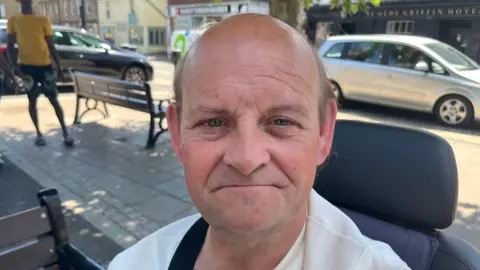Pip payments are a godsend, says single parent
 John Devine/BBC
John Devine/BBCA man said receiving Personal Independence Payment (Pip) has been a "godsend" and helped his family financially.
Christopher Smalley, 54, lives in March, Cambridgeshire, and is a single dad of two boys. His third son took his own life in 2020 aged 14, which triggered mental health issues and led him to claim basic Pip.
After he suffered a stroke last year, which affected his mobility, Mr Smalley now receives the higher enhanced payment.
He said: "Without the Pip, I'd be totally knackered. The money allows me to take my two boys out, without it we'd be stuck inside all the time."
Pip is paid to people in England and Wales who have difficulty completing everyday tasks or getting around as a result of a long-term physical or mental health condition.
The government is planning to change the eligibility criteria for Pip as part of its reforms to try and save £5bn.
After more than 120 backbenchers threatened to vote down the government's plans, the reforms were amended and all existing Pip recipients will remain on the current system and the proposed changes to eligibility will only apply to new claims from November 2026.
"I was really worried when I first heard about the proposed changes," Mr Smalley said.
"It took about 18 months after I applied [to receive] Pip. It was a difficult time and I got in to debt, which I have now cleared thanks to the benefit," he added.
Nick Howard, 51, from Cambridge, is neurodivergent and has been claiming Pip for five years.
"I currently work at a hospital four days a week," said Mr Howard.
"Without Pip I would not be able to work as it pays for my transport to and from my workplace.
"I'm currently buying an electric bike on credit, others I have had have been stolen or vandalised," he added.
 Nick Howard
Nick HowardMr Howard said he has a review of his benefit about every two years.
"It was a nightmare for me to get Pip in the first place, because of my condition.
"It took well over a year to secure it, it really is hard to fill out form after form if you are neurodivergent.
"Without Pip, I could not afford to work, as simple as that - I can't use any public transport because of my mental health.
"Pip also helps pay for my private counselling sessions I need to simply operate on a daily basis," he added.
Mr Howard said he was very surprised by the reactions he got when he posted on social media about his experiences.
"A lot of people gave me support, but an awful lot of others told me they were in the same boat as me.
I am still very anxious about what these reforms could mean for me," he said.
Sandie Burns, the chief executive officer of Disability Peterborough, a charity that provides services to help people living with physical disabilities in Peterborough and surrounding areas, said the whole welfare reform debate has caused "high anxiety" for people.
"It's scary for people, it is such a negative thing when people are told 'the money we've given you, we're now taking it back', we have never seen anxiety like it," she said.
"Nobody is saying the government shouldn't reform the benefits system, but what they should do is consult in the first place and that is what they have failed to do," she added.
In a House of Commons statement on Monday, Work and Pensions Secretary Liz Kendall said: "Welfare reform is never easy, but it is essential because there is no route to equality or social justice based on greater benefit spending alone.
"Our plans are rooted in fairness for those who need support and for taxpayers.
"They are about ensuring the welfare state survives, so that there is always a safety net for those who need it and that it lasts for generations to come."
Follow Cambridgeshire news on BBC Sounds, Facebook, Instagram and X.
